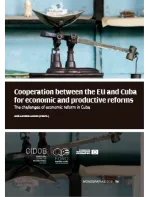Presentation

This volume on cooperation between the European Union (EU) and Cuba for economic and productive reform presents some of the results of the collaborative research from the first year of the Jean Monnet Network Europe-Cuba Forum project, funded by the Erasmus+ programme for three years from 2018 to 2021. The Jean Monnet Network Europe-Cuba Forum takes an academic approach to the economic, political, social and institutional reform processes underway on the island, which are essential to increasing Cuba’s global, regional and interregional integration. The project seeks to contribute to energising the new phase of constructive engagement in Cuba–EU relations following the signing of the Political Dialogue and Cooperation Agreement (PDCA) in December 2016. This agreement will facilitate greater Cuban integration in EU–Caribbean relations and in the regional programmes of the Strategic Partnership between the EU and the Community of Latin American and Caribbean States (CELAC). The PDCA makes the EU a strategic partner in promoting these reforms, which have become particularly crucial given the tricky conjuncture of a recessionary economic climate, a complex political environment aggravated by the Trump administration’s hostility, and the crisis provoked by the COVID-19 pandemic, all of which combine to once again test Cuban society’s resilience.
The project is divided into three thematic sections that are developed through joint multidisciplinary research. In the first year, the work focuses on the economic reforms needed for international insertion and the promotion of sustainable development. The second year addresses cooperation on institutional reform and social policies and, finally, interregional cooperation and global insertion is examined in the third year. For each section, an international seminar, a set of working documents, a policy brief and a book will be produced on each of the three topics.
This volume, coordinated by José Antonio Alonso, Professor of Applied Economics at the Complutense University of Madrid, addresses the subject of the first seminar and the results of the discussions of the working documents – in both the seminar itself and a later peer review process between the institutions in the consortium. Cooperation between the EU and Cuba for economic and productive reform: The challenges of economic reform in Cuba. While all the authors are economics scholars, in both cases the research has benefited from interdisciplinary discussions with the project’s other participants.
The Jean Monnet Network Europe-Cuba Forum is decidedly interdisciplinary in its approach. By bringing together a wide range of scientific communities, policymakers and professionals in Europe and Cuba, the boundaries of individual experience are broken down to draw on a range of political and academic fields, such as Economics, Law, Social Policy, Foreign Policy and International Relations. This multidisciplinary, collaborative approach also seeks to improve mutual knowledge and facilitate exchanges, strengthening Europe’s constructive role in the island’s economic and institutional reforms. Scientific collaboration is the project’s foundation, but at its heart are human exchange and building alliances that outlast the project. Since its inception, it has aspired to act as a unifying force for thinking about Cuba’s reality and its relations with Europe, fostering dialogue between a range of epistemic communities and economic, political and social actors. Its end goal is to identify cooperation priorities that guide public policies on shared Cuban and European Union agendas.
Anna Ayuso
Senior Research Fellow at CIDOB and coordinator of the Jean Monnet Network Europe-Cuba Forum